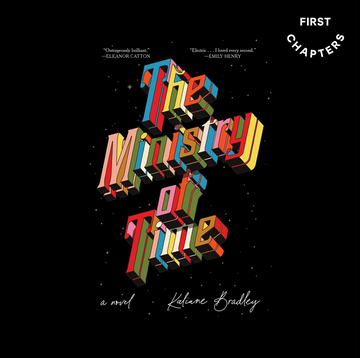Welcome to “First Chapters,” Cosmo’s column where we shine a spotlight to debut authors who you are definitely going to be obsessed with. And what better what for you to get to know them and their books than with the first chapter of their new release. This round we're highlighting Carmella Lowkis's gothic historical fiction novel, 'Spitting Gold,' a twisty new release that features two fraudulent mediums who decide to use their "powers" into tricking a family to give them everything they have. Here's some more info from Atria Books:
A deliciously haunting debut for fans of Sarah Waters and Sarah Penner set in 19th-century Paris, blending gothic mystery with a captivating sapphic romance as two estranged sisters—celebrated (and fraudulent) spirit mediums—come back together for one last con.
Paris, 1866. When Baroness Sylvie Devereux receives a house call from Charlotte Mothe, the sister she disowned, she fears her shady past as a spirit medium has caught up with her. But with their father ill and Charlotte unable to pay his bills, Sylvie is persuaded into one last con.
Their marks are the de Jacquinots: dysfunctional aristocrats who believe they are haunted by their great aunt, brutally murdered during the French Revolution.
The scheme underway, the sisters deploy every trick to terrify the family out of their gold. But when inexplicable horrors start to happen to them too, the duo question whether they really are at the mercy of a vengeful spirit. And what other deep, dark secrets may come to light?
Luckily the spirits say that you're going to be absolutely obsessed with this book. Don't believe them? We'll just let this sneak peek at the book's first chapter speak for itself.
“Charlotte . . . Why are you here?”
She hesitated, and then said, “Papa’s ill.”
“Not dying?” I asked, then winced at my own bluntness. It was not as if my sister would have come for anything less, not after how we had last parted. My nerves were beginning to buzz again. I could feel them like gnats in my skull.
“I . . . I don’t think so, no, for the time being. But if the doctor stops treating him . . .” Charlotte was looking very carefully at her hands. “I’ve burned right through my savings; the man’s good, but very expensive. I’ve done everything else I can think of, Sylvie, but I can’t pay the bills anymore.”
I shifted uncomfortably. “If you have come to ask for money—”
“That’s not why I’m here, I swear,” Charlotte said, holding up a finger to urge silence. “I know you can’t withdraw all that without the baron asking why. But I’m desperate. The kind of piecework I’ve been sewing just ain’t enough. Do you know what it pays? And to think that you and I used to make as much in a day as I now make in—”
Having already realized Charlotte’s meaning, I jumped in to interrupt. “That is entirely out of the question.”
“It’d only be one more time,” said Charlotte. “I’ve already found a client.” “I want no more to do with all of that.”
“I don’t remember you being so particular about ‘all of that’ when it was paying your dowry.”
I avoided her eyes. That had been a different time, of course. A time when consequences were something that happened to other people, never to us.
Charlotte reached a hand toward my shoulder but changed her mind halfway through and let it fall limp between us. “Please, Sylvie, you know I wouldn’t ask if I’d got another way out of this. Believe me, it weren’t easy to find you again.”
With good reason. It had been no accident that Charlotte had never received the change-of-address card.
We were silent for a moment as Charlotte repositioned herself to dry her back. “Do you never miss it?” she asked. “The thrill, the excitement.”
“The danger of being found out.”
Charlotte gave a devilish smile. “But weren’t that part of the fun? And now here you are: you, Sylvie Mothe—”
“Baroness Devereux.”
“A society lady. A pretty wife. Tell me, how is it that you’ve spent your day? Embroidery?”
“I happen to find embroidery quite stimulating,” I told her tersely. But Charlotte’s words had stirred up the memories that I had carefully hidden away, like the visiting card I had just locked in the drawer of my desk. I put a hand to the key about my neck.
“We were the best in the game,” said Charlotte.
“Yes, we were,” I said.
I had meant this to highlight the past tense of the statement, but Charlotte seemed to interpret my words as agreement. She said, “You were. Sylvie, I understand your worry. I do. Your husband—”
My husband. That was a thought that instantly dispelled any nostalgic reminiscences. “Alexandre is a wonderful man,” I said a little sharply. “An important man. You cannot possibly realize just how influential one’s reputation comes to be in our circles. Even the smallest whiff of scandal . . . It does not bear thinking about. I have to consider his career. And our future.” I absently placed a hand across my midriff as I thought of all that the word entailed.
Charlotte gave me a funny look. “You ain’t—?”
“No,” I said quickly, heat rising in my cheeks at the misunderstanding. “Not yet, but I mean that one day I hope to be. This is what I want, Charlotte. I know that you never wanted a life so . . . so ordinary. With your grand dreams of fame and adventure—”
“Our dreams,” Charlotte corrected me. “You played those make-believe games as much as I did.”
“But they were of your invention,” I insisted. “And my point is that those games of yours no longer fit into my life. So you understand that I am no longer at liberty to take the kinds of risks that you propose.”
Charlotte had wandered nearer to the mantelpiece now and was fiddling with the ornaments kept there. I watched to make sure none went into her pockets. “’Course I can see why you don’t want to put all this at risk,” Charlotte said. Her face had the appearance of composure, but there was a slight twitch at the very corner of her mouth. It was the same twitch that always appeared when she was mocking someone.
Surely our first meeting in over two years need not end in a quarrel? With some effort, I ignored the jab at my pride. “I wish that I could be of more help,” I said firmly, “but there is nothing I can do.”
Charlotte did not seem to mirror my qualms about falling into an argument, as she curled a lip and said with a curdling tone, “I knew family meant nothing to you, but I never imagined even you would turn your back on a dying man.”
There was a moment of silence, as if we both were too struck by the audacity of the accusation to continue our conversation. Rain pattered like fingers at the windowpane.
“You will leave my house now,” I said at last.
“I—”
“You will leave, and you will not return.” Saying this, I crossed to the bell and rang. “Virginie will show you out. If you do not go quietly, then I will be forced to call for the gendarmerie and tell them about the statuette in your pocket.”
Charlotte sneered and thrust a hand into her skirts, pulled out the statuette, and then threw it to the ground. A porcelain Eros with bow and arrow. Luckily, it did not break—it was a favorite of mine, a gift from Alexandre in the early days of our marriage. It was spared from any further acts of destruction by the arrival of Virginie.
“Please escort this woman back outside,” I said, raising my eyebrows to indicate that it might prove a difficult task.
“Cast me from your house, then!” Charlotte exclaimed. “But I hope you enjoy hellfire, Sylvie Devereux, because the Lord’ll surely cast you from his.” As damnations go, it was an impressive one, but Charlotte only believed in the Lord when it suited her purposes. She shouldered her way past Virginie, who was forced to hurry after her.
Then I was left alone with my anger. And oh, was I angry! It was a swelling, sickly wave in my chest. How dare she come crashing back into my life with this? To talk of family and dreams and God! Charlotte was a hypocrite through to the bone. To suggest that I should feel any hint of filial duty to our father, after all the ill treatment I had endured, years and years of it before I had managed to escape . . . And now it transpired that my sanctuary was not safe from it all; my old life could come striding in at any time, dripping on my carpets and pocketing my ornaments. I looked down at the statuette and felt a sudden wave of disdain, as if Charlotte’s touch had somehow sullied it. Before I was quite sensible of what I was doing, I had plucked it up and cast it against the wall. There was a satisfying peal as it splintered into pieces.
And as for Charlotte’s visiting card, that could go too. I fumbled to unlock the desk drawer, hands shaking with barely contained emotion, and yanked it open, setting the contents rolling out of order. Where had the damned thing got to? I rummaged among my knickknacks, intending to chuck the card into the fire. I could not find it. It must have skittered under something. I lifted items out, hoping to uncover it: a pair of scissors, a notebook, a little velvet pouch. This last gave me pause. I considered it, and then tipped it up so that the contents fell into my palm with a chink-chink. A locket on a chain. It was a pretty thing, although the silver was tarnished and the hinge was stiff when I eased it open. Inside was a miniature—our mother. A high-browed and pale-skinned face with beautiful dark eyes. Not that the image could capture even a fraction of what her eyes had been in life: those deep, inky irises that seemed to contain other worlds, like windows to the night sky. Neither I nor Charlotte had inherited these; we had our father’s river-water gray. No, our mother had been an exceptional beauty; a beauty that could occur only once, that could not be passed on.
Gazing into this paltry representation now, I knew what she would say. Be kind to your sister, and forgiving to your father. They need your care more than ever now I am gone.
I thought of all the trouble that Charlotte could get herself into: with her clients, with Papa, with the law. There was good reason that we had always worked as a pair in the past. And as the elder by six years, it had been my duty to watch out for her for as long as I could remember. But even if I wanted to help, how could I? There was my husband’s position as a deputy prosecutor to think of. Alexandre must be my first loyalty now: he was my new family.
But the locket felt warm, skin-like, under my thumb. Mama’s head was tilted at a slight angle, as if patiently awaiting the answer to some question.
It was probably too late to catch Charlotte. Even if she had put up a fuss, she would have been chased off by now. Would she not?
Shoving the locket into my skirts, I hurried out of the apartment and downstairs.
On the street, there was no sign of my sister. Luckily, Coulomb was there, leaning against the porter’s lodge. A pipe curved out of his lips.
“The woman who was here,” I said, dispensing with the usual pleasantries, “which way did she go?”
Following Coulomb’s smoke-choked response, I hurried down the street. I hadn’t run like this since I was a child. What on earth must Coulomb be thinking? I had not even stopped to put on outside clothes. I was still in my house slippers! Never mind; with luck, I would catch Charlotte before I caught cold. Was that her there? The hem of a cloak turning a corner—yes! I called her name desperately, my voice hoarse.
Charlotte turned, a look of surprise painting itself across her face as she recognized me. This was immediately replaced with one of chagrin. “Oh, for fuck’s sake, if it means that much to you, you can have it back,” she snapped, pulling a paper fan from her pocket with a flourish.
I stared at it blankly for several moments before I realized that I had last seen it decorating a nook in the entrance hall. Christ, when had Charlotte even had the chance to take it? “Never mind that,” I said, then had to stop when a sharp pain hit my chest, knives of cold exploding within me. I held up a hand: a signal to give me a moment. Once my lungs had stopped screaming, I tried again. “I wanted to ask— Not that I definitely will— I still have to— But if I did— What is the job?”
“You’ve changed your mind?”
“Yes. No.” I drew in another breath, concentrating on the feeling of my lungs expanding like a pair of bellows. Expand, contract. “I need to know more,” I said. “But not now; we cannot talk here. And it will be dinner soon. Can you meet me tomorrow?”
“Even better,” said Charlotte. “I’ve got an appointment to meet the clients. Come with me. If it’s too much, you can pack the whole thing in then and there. And if not . . .”
We both let the silence trail on.
“Very well,” I agreed at last.
Once we had negotiated a time and place to meet, we said our goodbyes, and Charlotte departed once more. She melted so effortlessly into the bustle of the streets, it would have been easy to imagine her insubstantial. But I knew well enough that even the insubstantial could wield a great deal of power.
Returning to my rooms—giving Coulomb a civil nod when I passed, as if nothing untoward had taken place—I tried not to dwell on the way my afternoon had unfolded. Best to put it out of mind until tomorrow. Seeing the state I was in, Virginie hurried to assist me in changing for the evening meal. Glad as I normally was of her company, that day I sent her away as soon as we were done, preferring to brood alone. I took up a pattern that I had been embroidering, but, before even a minute had passed, I had thrown it down again in disgust. All that I could hear was Charlotte’s teasing voice. And now here you are: you, Sylvie Mothe. The people who had known me by that name would hardly have believed where I was today. And the people who knew me as the baroness Devereux, well…They never needed to know the details of the rock out from under which I had crawled.
I ought to have been frightened. After everything I had done to reinvent myself, here was the threat of exposure if I committed even the tiniest blunder. Yet that was the thing—underneath the anxiety and irritation, there was a tremor of excitement, just as Charlotte had said. I could feel it fluttering in my midriff like a caged songbird. It had been locked away for over two years, but now it was ready to sing.
Excerpted from SPITTING GOLD by Carmella Lowkis. Copyright 2024 © by Carmella Lowkis. Reprinted by permission of Atria Books, an Imprint of Simon & Schuster, LLC.
Spitting Gold, by Carmella Lowkis, will be released on May 14, 2024. To preorder the book, click on the retailer of your choice:
AMAZON AUDIBLE BARNES & NOBLE BOOKS-A-MILLION BOOKSHOP APPLE BOOKS KOBO LIBRO.FM WALMART POWELL'S BOOKS HUDSON BOOKSELLERS GOOGLE PLAY EBOOKS.COM















